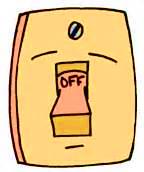Client story: An employee wanted to move to another workspace because the extreme glare on her desk made it hard for her to work.

Finally, after 2 weeks of squinting, she asked her manager to request that facilities move her to a different workspace.
When the facilities manager assessed the work required (changing IT wiring, moving file cabinets, etc.), she decided to do a little investigation first. She went to the light switch and flipped off the 3rd florescent bulb in the department’s overhead lights. Voila! The glare was gone.
9 out of 9 agree

The staff laughed at the simple solution. They joked with other departments about the fact that no one checked out the switch. Folks in other department smiled the smile of recognition that said, yup, we put up with stuff, too. After all, it’s just a little discomfort.
Oh, contraire
When we tolerate reoccurring situations that interfere with our attention and thus our performance, we unconsciously tell ourselves to ignore much more than the small distraction. We tell ourselves to ignore ourselves. We tell ourselves that what we need to do our job well doesn’t matter.
Here are a few common situations that interfere with performance:
- You’re on the phone and someone walks up and begins talking to you. You try to carry on both conversations at the same time.
- You’re given a task with a due date of “whenever you get to it” to which you agree. The next day the person calls and asks “How’s it coming? Are you done yet?”
- You receive an email without a clear request for action or input. You spend time worrying if you should reply and, if you do, what you should say.
I’m certain you can add to the list.
4 and 1/2 steps to reduce interferences
1. Look in the mirror and acknowledge that your behavior encourages the interference.
1/2. Look again and promise yourself to stop encouraging it.
2. Write down what you will say* next time the interference happens,
3. Give others a heads up about your new behavior. Tell them you are turning over a new leaf because you want to be more effective. Ask for their support.
4. Follow through on your commitment.
* Why write it down? Writing down what you’d like to say with respect, rather speak from reaction and emotional sludge, is the point. In a stressful situation, we retreat to our comfort zones and say what we’ve always said. Having these words visible (this is why stickies were invented) prompts you to say what your proactive, relationship-building self would say.
Don’t know what to say? Try these:
- To the Conversation Hijacker: Put the person on the phone on hold. Look the hijacker in the eye, smile and say with kindness: “I’ll be glad to talk to you after I complete this conversation.”
- To the “Due Whenever” person: If someone doesn’t give you a specific due date, offer one and ask if it works for them. Negotiate until you have a specific date.
- To the Hazy Emailer: Reply to him or her only – no “Reply All” – saying you are unclear what they are asking you to do and that you’ll be glad to reply when they tell you.

If I said any of these, I’d be branded as a rude, poor team player!
To that I say: If asking people to not interrupt you, to state outcomes at the beginning of a meeting and to use email effectively then I say it’s time to rock the boat. Rocking the boat now may keep it from sinking … and you with it later!
Opportunity for you, Ms./Mr. Silent Sufferer
I understand the reluctance to speak up. In the past, you were shot down, told to be quiet. You were promised something would change for the better, but it never did. You did your part, but to no avail. That was then, this is now. Move forward.
It’s risky to speak up and stop putting up with the glare of interferences. I say it’s riskier not to. Not asking for what you need to perform at your best costs you way too much. You were hired for your talents and skills. Make good on your commitment to do your best and speak up.
PS: If you need another reason to speak up, consider this: There’s a good chance that you’ll help other silent sufferers.
Subscribe
Get Camille's latest posts!
